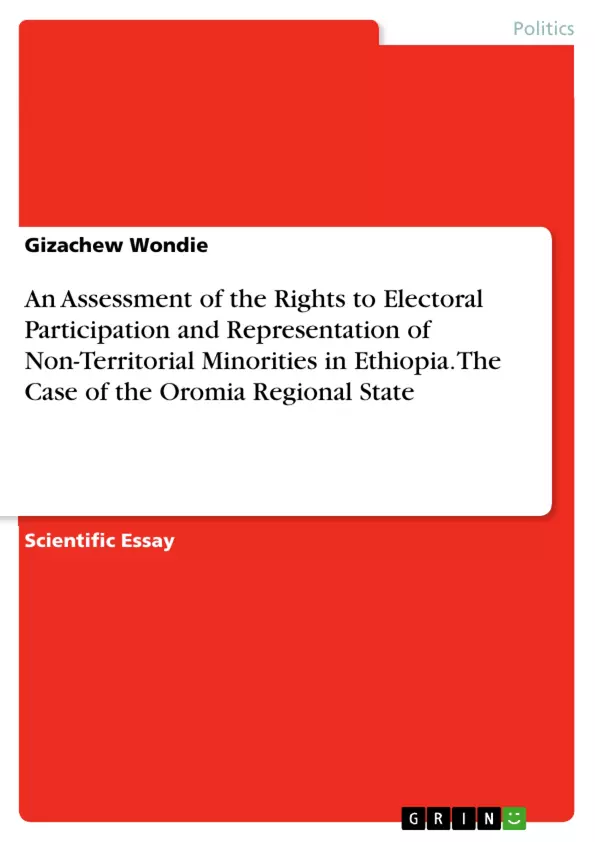Ethiopia is designed as an ethnicity-based federal state structure in order to respond to the challenges of minorities by developing a counter-majority institutional system.
However, the ethnic-based federal state structure also creates forms of local tyranny which will further complicate the challenges of minority rights at the local constituent units of the federation.
More importantly, the ethno-territorial organization of the federal units of Ethiopia left a number of non-native peoples of the country out of the constitutional recognition under the regional constitutions.
As one of the regional states of Ethiopia, Oromia Regional State, the largest in size and number of residents, is the major regional state in which large numbers of non-territorial minorities are found. The allocation of home land for each major ethnic group in the country complicated the right of these dispersed non-territorial minorities in the regional state.
Minding this, this paper attempts to assess the rights to electoral participation and representation of non-territorial minorities in Oromia Regional State/Ethiopia. In doing so, secondary documents like journal articles, books, magazines and reports were used. Data was also collected from different media and newspapers to get the full picture of the issue under study.
Accordingly, the paper generalizes that the Oromo use of regional autonomy for complete identification of their ethnic group and the non-territorial minorities clearly lacks legal and institutional protection in the regional states.
Inhaltsverzeichnis (Table of Contents)
- INTRODUCTION
- Background of the Study
- Statement of the Problem
- Objective
- Conceptualizing Non-Territorial Minorities
- Non-Territorial Minorities Under International Human Right Regime
- Non-Territorial Minorities in Ethiopian
- Non-Territorial Minority Rights in Oromia Regional State
- The Right to Elect and be Elected of Non-Territorial Minorities in the Region
- Representational Rights of Non-Territorial Minorities in the Region
- Mechanism of Protecting the Rights of Non-Territorial Minority in Oromia Regional States
- Institutional Protection Mechanism of Non-Territorial Minority Rights
- Constitutional Protection Mechanism of Non-Territorial Minority Rights
- Conclusion and Recommendation
Zielsetzung und Themenschwerpunkte (Objectives and Key Themes)
This paper aims to assess the rights to electoral participation and representation of non-territorial minorities in the Oromia Regional State of Ethiopia. It examines the challenges faced by these minorities in accessing political rights and explores the extent to which the regional state's legal and institutional frameworks provide protection and support for their participation.
- The impact of ethnic-based federalism on non-territorial minorities
- The legal and institutional protections available to non-territorial minorities in Oromia Regional State
- The challenges of electoral participation and representation for non-territorial minorities
- The role of regional autonomy in shaping the rights and status of non-territorial minorities
- The effectiveness of legal and institutional mechanisms in protecting the rights of non-territorial minorities
Zusammenfassung der Kapitel (Chapter Summaries)
- Introduction: This chapter provides the background of the study, highlighting the challenges of minority rights in Ethiopia's ethnic-based federal system. It examines the tension between the intention of the federal system to protect minority rights and the realities of local tyranny.
- Conceptualizing Non-Territorial Minorities: This chapter explores the concept of non-territorial minorities within both international human rights law and the context of Ethiopia. It examines the specific rights and challenges faced by non-territorial minorities in Oromia Regional State, focusing on the right to elect and be elected, and the limitations posed by the regional state constitution.
- Mechanism of Protecting the Rights of Non-Territorial Minority in Oromia Regional States: This chapter delves into the mechanisms designed to protect the rights of non-territorial minorities, analyzing both institutional and constitutional safeguards. It explores the effectiveness of these measures in practice and identifies potential shortcomings.
Schlüsselwörter (Keywords)
Federalism, Ethnic Group, Representation Right, Electoral Rights, Minority, Non-Territorial Minority, Regional Autonomy, Oromia Regional State, Ethiopia.
Frequently Asked Questions
What are non-territorial minorities in Ethiopia?
Non-territorial minorities are ethnic groups living outside their designated "homeland" regions in Ethiopia's ethnic federal system, often lacking constitutional recognition in their place of residence.
How does ethnic federalism impact minority rights?
While intended to protect ethnic diversity, it can create "local tyranny" where dominant regional ethnic groups marginalize non-native residents in local constituent units.
What is the specific situation in Oromia Regional State?
Oromia is the largest region with many non-territorial minorities. The study finds that these groups often lack adequate legal and institutional protection for their political rights.
Do non-territorial minorities have the right to elect and be elected?
Legally, they should have these rights, but in practice, the ethno-territorial organization of the state often limits their effective electoral participation and representation.
What mechanisms exist to protect these minorities?
The paper examines both institutional and constitutional protection mechanisms, but concludes they are often ineffective in ensuring fair representation for non-native peoples.
What is "regional autonomy" in the Ethiopian context?
Regional autonomy allows ethnic groups to manage their own affairs within a state. However, in Oromia, it has led to a complete identification of the state with the Oromo ethnic group, often at the expense of others.
- Quote paper
- MA Gizachew Wondie (Author), 2015, An Assessment of the Rights to Electoral Participation and Representation of Non-Territorial Minorities in Ethiopia. The Case of the Oromia Regional State, Munich, GRIN Verlag, https://www.grin.com/document/345503



